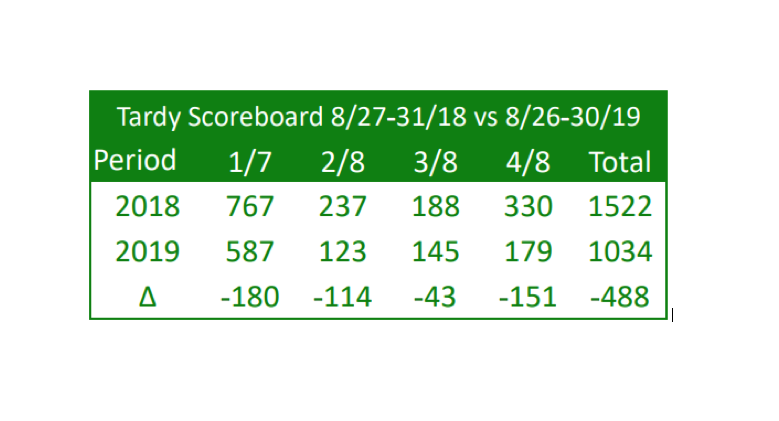Number of tardies drops with new tardy policy in place
After an astronomical number of tardies last year, the faculty decided to overhaul the tardy policy. Away went the tardy tables and 10 minute grace period, and in came hallway sweeps, escorts and more teacher control.
“Too many tardies were happening,” Maryjane O’Halloran-Beane, librarian, said. “Students who are not in class can’t learn the same material as those who are not tardy.”
A group of teachers and administrators took on the task in May to redesign how tardies are handled.
“We wanted to put more of the control back in the classroom with the classroom teacher,” Vana Shaw-Stines, assistant principal, said. “We were looking for a reduction in tardies, an improvement on attendance, and an increase of student success.”
Instead of students’ picking up a green tardy pass and taking their time to get to class, they now go straight to class and their teacher marks the tardy in TEAMS. At the first tardy, a student will receive a warning; the second tardy, a parent phone call; the third tardy, a detention (either with the teacher or in the cafeteria); the fourth tardy, a contact with their assistant principal; and the fifth tardy a referral and additional consequences with the assistant principal.
“The new policy places more of the control on the teacher since students are ultimately missing time in their classrooms,” Shaw-Stines said.
Habitual tardiness will result in more severe consequences such as loss of cell phone, OCS or Home Based Suspension.
The new policy has received positive reviews from the faculty.
“Teachers want students in class and ready to learn, and students don’t appreciate having classes interrupted when others come in late and don’t know what is going on,” O’Halloran-Beane said. “Less tardiness is [a] win-win for everyone.”
However, the students feel differently.
“I feel like the tardy policy is really extra this year,” Kimberly Rodriguez, sophomore, said. “I know we had a large amount of tardies last year, but what they’re doing is too much. We have like one warning and that’s it.”
Though some students aren’t in favor of the new policy, it has made a difference. In the first two weeks of school, there were nearly one-third less tardies than during the same time last year.
“They seem to know we mean business this year and tardiness will not be tolerated,” Shaw-Stines said. “You cannot be tardy to a job and keep your job; so we wanted students to take ownership of their tardiness and focus on being on time.”

Hello all! This is my senior year and I've been in Newspaper for 1 year now. I joined to finish my last year off because I love to write and as far as...

